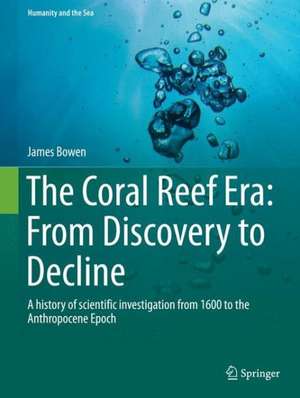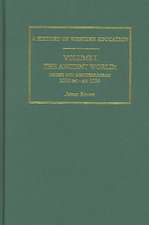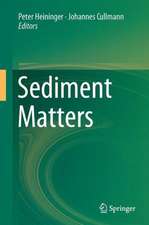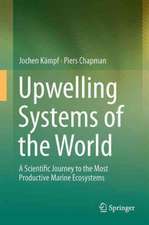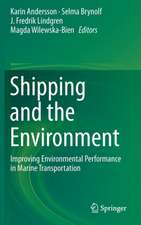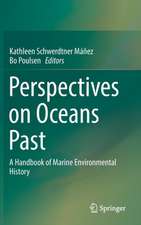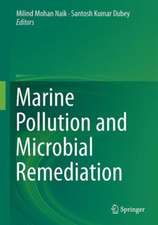The Coral Reef Era: From Discovery to Decline: A history of scientific investigation from 1600 to the Anthropocene Epoch: Humanity and the Sea
Autor James Bowenen Limba Engleză Hardback – 20 ian 2015
Relying heavily on primary source material Part 1 traces the sequential evolution of scientific thought and practice as the author explores the way this evolution is reflected in the search for understanding corals. At each stage, answers lead to fresh questions that challenge investigators to solve the riddle and new branches of science emerge. Then, with the first enigma finally understood, a new enigma arose. Why are Reefs dying? Part 2 traces the range of problems that have emerged in the past 50 years as marine, ecological, reef and climate scientists attempt to put the pieces of the jigsaw together. Is there a new “canary in the coal mine” warning of the fate of the world as we know it if man’s impact on his environment continues unchecked?.
| Toate formatele și edițiile | Preț | Express |
|---|---|---|
| Paperback (1) | 643.00 lei 6-8 săpt. | |
| Springer International Publishing – 14 oct 2016 | 643.00 lei 6-8 săpt. | |
| Hardback (1) | 578.30 lei 38-44 zile | |
| Springer International Publishing – 20 ian 2015 | 578.30 lei 38-44 zile |
Preț: 578.30 lei
Preț vechi: 722.87 lei
-20% Nou
Puncte Express: 867
Preț estimativ în valută:
110.67€ • 120.17$ • 92.96£
110.67€ • 120.17$ • 92.96£
Carte tipărită la comandă
Livrare economică 18-24 aprilie
Preluare comenzi: 021 569.72.76
Specificații
ISBN-13: 9783319074788
ISBN-10: 3319074784
Pagini: 195
Ilustrații: XV, 195 p. 35 illus.
Dimensiuni: 210 x 279 x 17 mm
Greutate: 0.7 kg
Ediția:2015
Editura: Springer International Publishing
Colecția Springer
Seria Humanity and the Sea
Locul publicării:Cham, Switzerland
ISBN-10: 3319074784
Pagini: 195
Ilustrații: XV, 195 p. 35 illus.
Dimensiuni: 210 x 279 x 17 mm
Greutate: 0.7 kg
Ediția:2015
Editura: Springer International Publishing
Colecția Springer
Seria Humanity and the Sea
Locul publicării:Cham, Switzerland
Public țintă
ResearchCuprins
PART I: The Natural History Quest, 1600-1900.- PART II: A New Era in Reef Science.
Recenzii
“How long will the coral reefs of the world be alive? Australian ecologist James Bowen … attempted to answer this question through a historical study of how knowledge of reefs and reef creatures has progressed. … Those interested in coral reefs will find the Bowen volume extremely useful. Summing Up: Highly recommended. Upper-division undergraduates through faculty and professionals; general readers.” (L. T. Spencer, Choice, Vol. 52 (12), August, 2015)
Textul de pe ultima copertă
On 4 June 1629, the Batavia, pride of the Dutch East India Company Fleet, was wrecked on her maiden voyage in a seemingly empty expanse of the Indian Ocean. The question “how did this happen?” led to 300 years of investigation by those curious to solve the enigma: what are corals, and how are coral reefs formed?
Relying heavily on primary source material Part 1 traces the sequential evolution of scientific thought and practice as the author explores the way this evolution is reflected in the search for understanding corals. At each stage, answers lead to fresh questions that challenge investigators to solve the riddle, and new branches of science emerge. Then, with the first enigma finally understood, a new enigma arose. Why are Reefs dying? Part 2 traces the range of problems that have emerged in the past 50 years as marine, ecological, reef and climate scientists attempt to put the pieces of the jigsaw together. Is there a new “canary in the coal mine” warning of the fate of the world as we know it if man’s impact on his environment continues unchecked?
Relying heavily on primary source material Part 1 traces the sequential evolution of scientific thought and practice as the author explores the way this evolution is reflected in the search for understanding corals. At each stage, answers lead to fresh questions that challenge investigators to solve the riddle, and new branches of science emerge. Then, with the first enigma finally understood, a new enigma arose. Why are Reefs dying? Part 2 traces the range of problems that have emerged in the past 50 years as marine, ecological, reef and climate scientists attempt to put the pieces of the jigsaw together. Is there a new “canary in the coal mine” warning of the fate of the world as we know it if man’s impact on his environment continues unchecked?
Caracteristici
Links the struggle to understand the nature of corals to the development of scientific understanding and the emergence of the “new sciences” from 1600 to the 20th century The history acts as case study to understand why changes in scientific thought occurred and how they impacted on scientific challenges and understandings Strong focus on the impact of these developments, especially in the fields of taxonomy, ecosystem analysis, oceanography, climate science, nuclear technologies Includes supplementary material: sn.pub/extras
